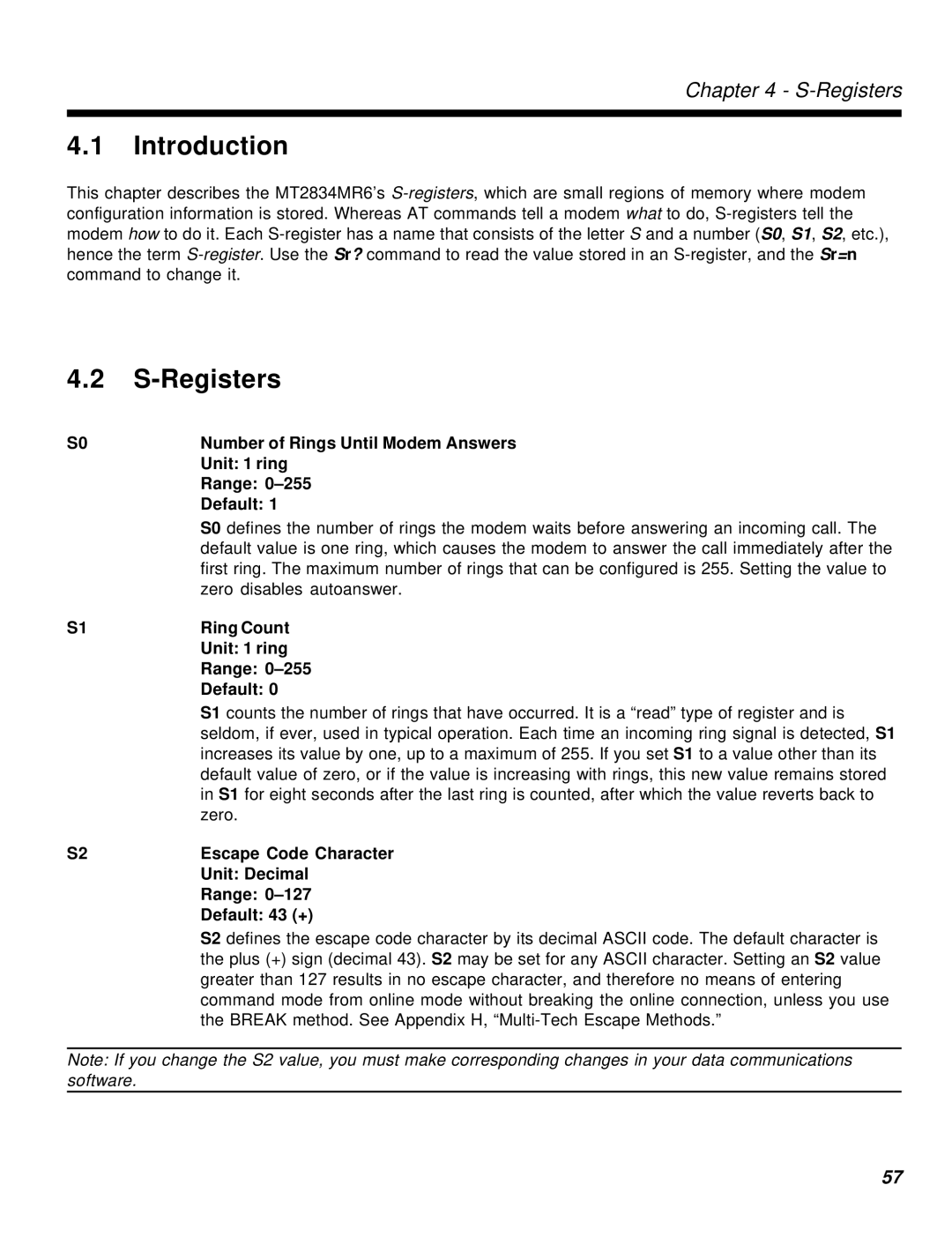User Guide
Trademarks
Revision Date Description
Contents
Registers
Warranty & Service
Index 116
Introduction
Manual Organization
Introduction
Description
FCC Regulations for Telephone Line Interconnection
FCC Fax Update
Canadian Limitations Notice
Technical Specifications
Bell 103/113
Diagnostics
300 bps
Fax Carrier
Power Supply
Busy Switch
Modem LED Indicators
Speed
Data Rate bps LED State
Safety Warnings
10 MT2834MR6 Installation Notes
Dialing and Answering
Dial-Up Handshaking Details
Dial-Up Automatic Answering
Call Termination
AT Commands
Modes of Operation
Working with AT Commands
Command Editing
Command Structure
AT Commands
Flow control disabled
Baud adjust
Modem baud rate
Serial port baud rate
Alternate out-of-band escape sequence
Force answer mode
Escape sequence selection
Go back online
Default none
Dialing Commands
Dial
= phone number
Default P
Dial Modifier Commands
Default R0
Pulse or Tone Dialing
Or 4 through 255 seconds International models
ATDT1028806127853500 $123456789
NdNe Number Linking = 0 or = 1 or Default none
Phone Number Memory Commands
P9,T14089876543
T14082345678
Default &W1
Configuration Storage and Recall Commands
Default &F8
= 0, 8, or
ATZ
AT&W1 default
AT&F8&W0
AT&F9&W0
Modem Response Result Code Commands
Default
Default &A0
Result Codes and Call Progress Selection
#An Auto Speed Detection Default #A0
Online Connection Commands
Default B0
DCn AT Command Control = 0 or Default %DC0
CDn Cleardown at Disconnect = 0 or Default &CD0
DTn Dtmf Detection = 0 or Default DT0
#Fn Fallback Modes = 0, 1, or Default #F2
Default *H0
Default &G0 models outside U.K
Default &P0 Models outside U.K
G2 U.K. models only
#T1 enables TCM
#T0 disables TCM
Default Y0
Issued
V.34 Commands
Default &C1
RS-232 Interface Commands
Default &D2
Default &R1
Go high again
Default &S1
S0 forces DSR high
S1 allows DSR to act normally, that is, to follow CD
Default &E1
Error Correction and Data Compression Commands
Default &E15
#Ln Error Correction Modes Default #L0
$En Error Correction at 300 bps = 0 or Default $E0
$An Autoreliable Buffering = 0 or Default $A0
$Rn Retransmit Count = 0 or Default $R0
Speed Conversion Commands
$SB300
$SBn Serial Port Baud Rate = speed Default $SB57600
$SB1200
$SB2400
Immediate Action Commands
Rate Renegotiation
BSn Maximum Reliable Block Size = 0 or Default &BS1
Flow Control Commands
$EBn Asynchronous Word Length = 0 or Default $EB0
Flow Control Disable
Default &E8
Default &E6
Non-Error Correction Mode Flow Control
Default &E10
#Xn Number of Xoff Characters Sent = 0 or Default #X0
Default &E13
Pacing Computer-Initiated Flow Control
= 12 or
Escape Sequences
Atcr Remote Configuration Escape Sequence
Remote Configuration Commands
Line Probe Commands
Diagnostic Commands
Registers
Registers
Default 10 J
Default 13 M
Default 8 H
Return Character
Default 45 North America and International
Time for Carrier Abort Timer
Unit 1 second
Range 1-255 U.S.A
Maximum S11 value is 255 ms 255 units
Registers
Registers
Reading and Assigning S-Register Values
Examples of Assigning Values
Examples of Reading Values
AT Commands Affecting S-Registers
Error Correction, Data Compression & Speed Conversion
Error Correction, Data Compression, and Speed Conversion
How V.42 Detects and Corrects Errors
MNP Classes
Data Compression
1 #L0 Command
V.42 Mode Select Command #L
2 #L1 Command
3 #L2 Command
Reliable Mode &E2
Non-Error Correction Mode &E0
Autoreliable Mode &E1
Modes of Operation
Flow control and pacing
Flow Control
Modem-Initiated Flow Control
1 XON/XOFF Flow Control &E5
Hardware Flow Control &E4
Pacing &E13
Non-Error Correction Mode Flow Control &E10 and &E11
1 XON/XOFF Pass-Through &E7
Hewlett Packard ENQ/ACK Pacing &E9
Non-Error Correction Mode Flow Control
10.1 V.42 Error Correction Modes
Modem-Initiated Flow Control
10.3 XON/XOFF Pass-Through
LAP-M Error Correction
MNP Error Correction
Result Codes
Speed Conversion
Modem Baud Rate $MB
Baud Adjust $BA
Serial Port Baud Rate $SB
Autoreliable Buffering $A
Related Commands
Maximum Block Size &BS
Autoreliable Fallback Character $F
13.5 V.42 Error Correction at 300 bps $E
Summary
Retransmit Count $R
Testing & Troubleshooting
Testing and Troubleshooting
Local Analog Loopback Test V.54 Loop
Test Procedure
Remote digital loopback test
Remote Digital Loopback Test V.54 Loop
Local digital loopback test
Local Digital Loopback Test V.54 Loop
Warranty & Service
Multi-Tech Systems, Inc. Warranty & Repairs Policies
Warranty
2 U.S. and Canadian Customers
International Distributors
International Customers outside U.S.A. and Canada
Repair Procedures for U.S. and Canadian Customers
Repair Procedures for International Customers
Repairs
Technical Support
Internet Site
Country Telephone
Appendices
Appendix a
Ascii Conversion Chart
Dial Pulses
Appendix B
Figure B-2. Standard Dtmf frequencies
Tone Dial Frequencies
Result Code Summary
Appendix C
Standard AT Result Codes &Q1
Register Unit Range Default Description
Appendix D
Register Summary
S34
AT Command Summary
Command Values Description
Appendix E
CDn
100
101
102
103
104
105
RS-232C Interface Specifications
Signal Information Negative Positive
Appendix F
Transmitted Data TD Pin 2 To modem
Functional Description of the RS-232C Signals
Test Voltage +V Pin From modem
External Transmit Clock XTC Pin To modem
Appendix G
Cable and Connector Diagrams
Introduction to MultiTech Escape Methods
Appendix H
Escape Method 1 +++ATCR
How to Select an Escape Method
Aborting an Escape Sequence
Registers and Escape Sequence
Introduction to Remote Configuration
Basic Procedure
Setup
Changing the Remote Escape Character
Changing the Passwords
Index
Index
118
119
120
121
122
S000326A

